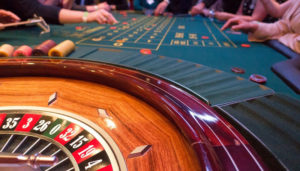Las Vegas Gambling Tips – A Little Math and Some Reality
Las Vegas Gambling Tips: A Little Math and Some Reality
On The Town With Vegas Vic
By: Victor H. Royer
Welcome to Las Vegas! My name is Victor H. Royer, but everyone just calls me Vegas Vic. I was named after that famous neon sign in Downtown Las Vegas, that cowboy with the hat on top of the Pioneer Club, always waving his hand and beckoning to his long love, Sassy Sally, on the other side of the street. I will be writing a few articles for AccessVegas.com, so I hope you enjoy them.
A Little Math and Some Reality
In a 2003 issue of Card Player magazine (Volume 16, No. 15, July 18, 2003, page 34), renowned game theorist and mathematician, David Sklansky, wrote what to my thinking is one of the most important articles about poker, and gambling in general, that has yet appeared anywhere. It shows in David’s own words what I think so many players, authors, statisticians, mathematicians, and experts have seemed to have forgotten, or have chosen not to discuss. And it is not what you may think.
Before I go on with my discussion, I first want to categorically state that I am not in opposition to David, and that I happen to hold him and his works in the highest regard. Because of what I am about to say, it is important that all readers remember this — it would be very easy to misunderstand the point of my article, or of my discussion.
In his article, David describes a hand that he played at the 2003 WSOP, in the main event. He describes the circumstances of the big blind’s all-in move, and his thinking process that eventually led him to his decision to call all-in with pocket 7s. You should read that article for yourself before continuing with my article here, because it will help you understand the point of my discussion, and it really isn’t necessary for me to reprint that article in its entirety here in my column. Suffice it to say that David’s decision to call was the result of some seriously positive mathematics. David reasoned that he had about 36.5 percent chance of an even bet, under those circumstances. Further, he postulated that his opponent’s holdings were probably something like A-K or A-Q. His calculations are very well demonstrated in that portion of his article, and he reached the conclusion that his chances were “about 34.5 out of 87, just short of 40 percent.”
Based on this very detailed and perfect mathematical analysis, David reached the conclusion that his call was justified. He called. As he expected, he writes, “…. my well-known opponent showed K-Q.” He continues to point out that had he considered the K-Q possibility in his calculations, he would now actually have more than a 40 percent chance to prevail. As a result of this, David concludes that “…. my call was clear-cut.”
Now, it is here that I have a point of discussion that seems to have been overlooked. All this calculation was perfect, good, and fine, and excellently demonstrated the “laboratory thinking” that is required to prepare such a wonderfully neat theory of what to do, when, and why. But what of this moment? This particular situation? This event? This “now”? Well, as David so succinctly put it in the last line of his article, all of that thinking and calculating “…. didn’t stop a King from coming.”
And that’s my point. There is always this “what if” factor, and although mathematics does allow for variances, variables, and the anomalous occurrences of unexpected events, often such theoretical thinking doesn’t allow for the actual real-world impact of the occurrence of the irregular, the indefinable, the incalculable and the numerically unquantifiable. What was David’s point in this championship? I hope it was to win, rather than to validate the theory of the mathematical analysis that led to the theoretically-correct but factually devastating reality. If the objective is to win, then the process of doing so does not require mathematics alone — it also requires the ability to not use it when the moment calls for a non-numerical consideration. In this case, perhaps, the thought may have been to save the small stack and play another hand. The challenge of the all-in call may have been “clear cut” when thought through from within the confines of the mathematical model of game theory, but was clearly the wrong thing to do in the light of the real-world reality. The outcome speaks for itself.
Well, before all of you math wizards start craving for my blood and building scaffolds, let me assure you that I am in no way disputing, nor diminishing, the importance of mathematics in gambling, nor in the strategies that are required for gaming success. On the contrary — I am very fond of such clear-cut analyses. I do, however, wish to point out that over-reliance on mathematics alone is not the sole and only answer — the math, the stats, and odds and percentages are all important, but more as a guideline to success, rather than the Holy Grail of all that there is, or should be. A little metaphysical smarts just may add a little color to all those dry and dark numbers.
Victor H. Royer, known as Vegas Vic, is the author of 42 books. Mostly known for books, articles, and columns on casino games and gambling, he is also the author of New Casino Slots, Great Gamblers: True Stories and Amazing Facts, The Great American Joke Book, as well as his works of Fiction, which include: Another Day, and the Western: Riders on the Wind. Versatile and multitalented, Royer is the creator, producer, and host of the Web-TV show Great Casino Slots, now showing at www.LasVegasLiveTV.com. He also composes music and performs under the names Glenn Diamond, Pappy Jones, Hans Dorfmann, and Miguel Armandaiz. For more information, please visit him at www.MoreCasinoDeals.com and www.GamingAuthor.com. Sign up for the Insider Advantage Newsletter at: http://www.accessvegas.com/old-access/membership
His books can be ordered through this website, by following the links provided
(c) Copyright 2016 Victor H. Royer. All rights reserved. For syndication purposes, contact GSR Holdings Inc. at: [email protected]
Return To Las Vegas Gambling Tips







